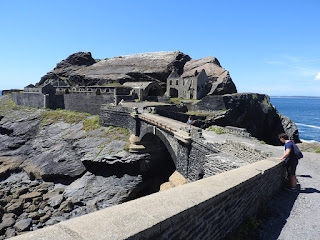On our camping trip to Camaret we also re-visited the Fort des Capucins, this time with sensible shoes so that we could climb down the cliffs for a closer look. This fort was built in 1848 to control the narrow stretch of water that leads into the anchorage at Brest. It was extensively modernised in the 1880's and 1890's against both torpedo boats, with an upper quick firing battery and searchlights, and pre-dreadnought warships with an underground battery of two massive 47 ton 305mm cannon.
These were removed in 1917, presumably for use on the Western Front, using block and tackle, a special ramp and trolleys, which must have been a prodigious feat of engineering and quite a challenge. The ramp is the way down to the fort now and very steep. The site is spectacular and readily accessible, despite being in a state of considerable disrepair and potentially quite hazardous, with the underground casemates for the cannon not blocked off, although some of the side passages are restricted by locked gates.
These were removed in 1917, presumably for use on the Western Front, using block and tackle, a special ramp and trolleys, which must have been a prodigious feat of engineering and quite a challenge. The ramp is the way down to the fort now and very steep. The site is spectacular and readily accessible, despite being in a state of considerable disrepair and potentially quite hazardous, with the underground casemates for the cannon not blocked off, although some of the side passages are restricted by locked gates.


























An impressive place.
ReplyDeleteThat's a cracking spot Jim. When I visited about 20 years ago, you could get down to a casemate almost at the water line which still had a torpedo in it. It was on a trolley and very corroded, but no doubt what it was. I was also interested in the small arms damage to the buildings as you cross the bridge.
ReplyDeleteI missed that but it was pretty choppy so the base of the cliff was off limits. The small arms damage is very clear and its not difficult to work out where the firing came from by looking at the angle of impact.
ReplyDelete